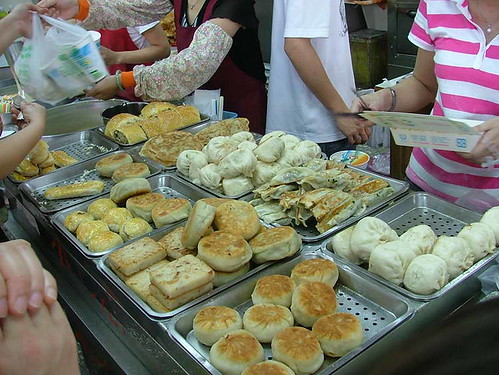Goodies at a small shop near Jiufen.
It's a wondrous transmutation, where the blood of one man is turned into the money of another. Lead into gold is nothing to it.
Several good pieces in Taipei Times this week on the developmentist state that runs the domestic political economy and its negative effects on local lives and the island's environment. Commentator Lai Min-huang observes that
Chiayi floods are man-made:
On June 3, Changhua, Yunlin and Chiayi counties and Greater Tainan were hit by a series of thunderstorms. Most streets in Chiayi City are supplied by the high-lying Lantan Reservoir (蘭潭水庫) on the east side of the city toward lower areas on the west side. Given that Chiayi is built on hilly land about 100m above sea level and considering its geological composition of red soil and gravel beds, it is not an area in which floods should easily occur.
The main cause of the floods is connected to the rising property prices over the past decade. Before development, most of the land was hilly terrain that effectively drained and held back floods. The hinterland around Chiayi Park and the Chiayi Botanical Garden performed a similar function. However, almost all of these hills have been developed into luxury homes and non-agricultural village estates for the rich. These commercial developments are paved with impermeable surfaces.
Consequently, even Chiayi University’s Lantan campus is awash with mud. When rain fell on Fenci Lake (奮起湖) and the upper reaches of the Bajhang River (八掌溪) 20 years ago, it took about eight hours to reach the south side of Chiayi City 40km away. Now it takes little more than two hours to arrive.
The housing bubble is driving ever expanding development of hills and mountains near cities, a process that began in the 1990s after the first housing bubble. The author notes that the flooding is also linked to the greater power of storms and rising seas driven by humans heating the earth, an outcome of developmentalist mentalities everywhere. The rapidity with water from the hills now reaches the sea, thanks to construction-industrial state concreting of so many of Taiwan's rivers, was a major cause of the massive flooding in southern Pingtung after Morakot.
This constant development is laced with bitter irony for the island's ordinary people.
Another TT commentator noted this week:
However, not long ago, the Ministry of Justice released data comparing housing prices and incomes. The comparison allows observers to estimate how affordable housing is. The ministry’s data ranked Taipei and New Taipei City first and third in the world, with housing price to annual income ratios of 15.01 and 12.67 respectively. The loan burden was 63 percent and 53 percent respectively, resulting from the government allowing the commercialization of housing.
The public housing that the administration promoted in the past was built at below-market costs, but it was common knowledge that once the properties were sold on to future buyers, their prices would be more equivalent to the going market rate.
This was undoubtedly because the government helped the public drive up housing prices, which was why the public housing policy failed and was called “lotto housing.”
.....
The affordable housing policy that the government started pushing in 2010 might sound novel and original in name, but it is not very different from the old public housing policy. It aims to cheaply sell land to developers who stand to make a profit on construction work.
The writer observes that this development proceeds apace, despite the fact that the cities are filled with empty homes. This is not difficult to explain: subsidies for construction and land development make it so lucrative that a developer need merely fill half the homes in a large project to break even.
The policy the government has selected to bring down housing prices is to
build more housing. Who benefits? People who build homes and develop land, of course. There are many policies the government might choose, such as subsidizing rents, direct subsidies to workers to pay for housing, or buying empty residences and renting them. But none of these policies benefits the construction-industrial state that runs Taiwan because they do not result in new land being "developed" or new buildings being thrown up.
The writer's main point is simple: public housing should be for rent only. If you make it sellable, people will simply buy it at the below market price it is offered, and then sell it at the market price, realizing a quick profit. Boom! No wonder they say the lucky recipients of the right to buy public housing have hit the lottery! Thus, public housing simply becomes another speculator's tool helping to keep market prices high and the price of homes out of reach of ordinary people. The only reason people can survive is because rents remain astoundingly low; not many places where you can pay $300 US a month rent on a home that might sell for $500,000 US. The vast number of empty buildings paradoxically keeps rent low. If they ever rise, there'll be blood in the streets...
A
2012 piece commented on the government's intimate relation with construction firms in the public housing market:
Bidding for the government’s affordable housing project is finished and “lottery-style” public housing will be built next to the A7 station on the future airport MRT line. However, the Housing Act (住宅法) passed late last year does not define “social housing.” It states only that 10 percent of new social housing must be reserved for disadvantaged groups. The government shirks all responsibility for the project, which will be a BOT project favoring construction companies. Housing prices will be announced on a district-by-district basis so pricing is neither transparent nor based on real market prices.
That writer also noted that other countries in the region social housing provision exceeds Taiwan's.
Destroying the environment? Consuming the future of the nation's workers? Yes, and taking a wrecking ball to justice.
A commentary in the Taipei Times pointed out:
The reason the corruption case involving former Taoyuan County deputy commissioner Yeh Shih-wen (葉世文) has caused such alarm is that Yeh was also for a long period in charge of the Construction and Planning Administration. In this position, he passed countless urban planning and renewal projects, as well as land zoning changes for non-urban areas, many of which would have involved forced land expropriation.
Past land expropriation appeals have been mere formalities, mostly for show, so if the Urban Planning Commission has passed a motion, the subsequent land expropriation is practically guaranteed. A case in point is the verdict handed down by the Greater Taichung High Administrative Court on the Dapu Borough (大埔) demolitions in Miaoli County, the appeals for which were cursory at best, taking on average little more than five minutes each to go through.
It has been many years since martial law was lifted, yet the government has not changed in terms of its excessive use of land expropriation. If anything, things have become worse in the past few years. For example, in the period up until late December 2012, the government completed the expropriation of 95 zones, involving about 7,672 hectares.
The mere formality aspect of appeals processes is common whenever the big money touches on an aspect of Taiwan life, from land development to ECFA and the services pact, whose KMT-led "review" was originally declared over before it had begun.
_______________________
[Taiwan] Don't miss the comments below! And check out my blog and its sidebars for events, links to previous posts and picture posts, and scores of links to other Taiwan blogs and forums!

